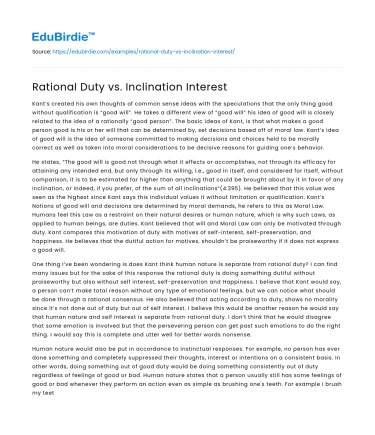Kant’s created his own thoughts of common sense ideas with the speculations that the only thing good without qualification is “good will”. He takes a different view of “good will” his idea of good will is closely related to the idea of a rationally “good person”. The basic ideas of Kant, is that what makes a good person good is his or her will that can be determined by, set decisions based off of moral law. Kant’s idea of good will is the idea of someone committed to making decisions and choices held to be morally correct as well as taken into moral considerations to be decisive reasons for guiding one’s behavior.
He states, “The good will is good not through what it effects or accomplishes, not through its efficacy for attaining any intended end, but only through its willing, i.e., good in itself, and considered for itself, without comparison, it is to be estimated far higher than anything that could be brought about by it in favor of any inclination, or indeed, if you prefer, of the sum of all inclinations”(4:395). He believed that this value was seen as the highest since Kant says this individual values it without limitation or qualification. Kant’s Notions of good will and decisions are determined by moral demands, he refers to this as Moral Law. Humans feel this Law as a restraint on their natural desires or human nature, which is why such Laws, as applied to human beings, are duties. Kant believed that will and Moral Law can only be motivated through duty. Kant compares this motivation of duty with motives of self-interest, self-preservation, and happiness. He believes that the dutiful action for motives, shouldn’t be praiseworthy if it does not express a good will.
Save your time!
We can take care of your essay
- Proper editing and formatting
- Free revision, title page, and bibliography
- Flexible prices and money-back guarantee
One thing I’ve been wondering is does Kant think human nature is separate from rational duty? I can find many issues but for the sake of this response the rational duty is doing something dutiful without praiseworthy but also without self interest, self-preservation and Happiness. I believe that Kant would say, a person can’t make total reason without any type of emotional feelings, but we can notice what should be done through a rational consensus. He also believed that acting according to duty, shows no morality since it’s not done out of duty but out of self interest. I believe this would be another reason he would say that human nature and self interest is separate from rational duty. I don’t think that he would disagree that some emotion is involved but that the persevering person can get past such emotions to do the right thing. I would say this is complete and utter well for better words nonsense.
Human nature would also be put in accordance to instinctual responses. For example, no person has ever done something and completely suppressed their thoughts, interest or intentions on a consistent basis. In other words, doing something out of good duty would be doing something consistently out of duty regardless of feelings of good or bad. Human nature states that a person usually still has some feelings of good or bad whenever they perform an action even as simple as brushing one's teeth. For example I brush my teeth everyday but it has a purpose though I might not be happy doing it, I know it’s good for my teeth. I don’t understand how someone even as intelligent as Kant can ignore Humes’s idea of a state of nature or even the thought of human nature all together. It feels as if Kant compares man in the state of nature as a divine and rationally evolved creation and I believe this is a very flawed concept of thought.






 Stuck on your essay?
Stuck on your essay?

